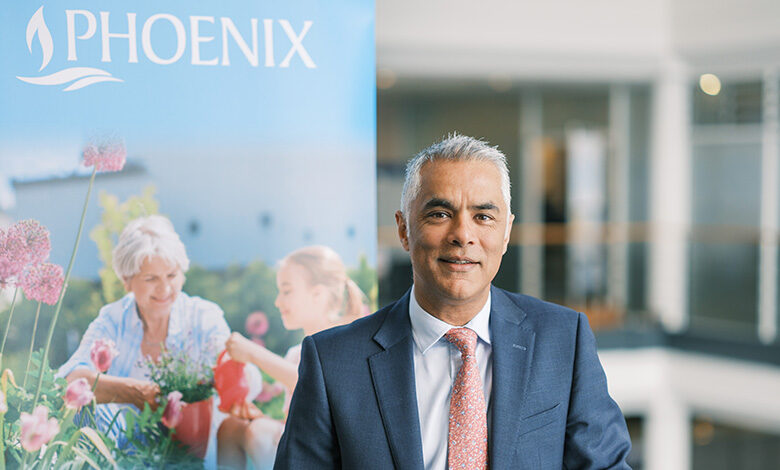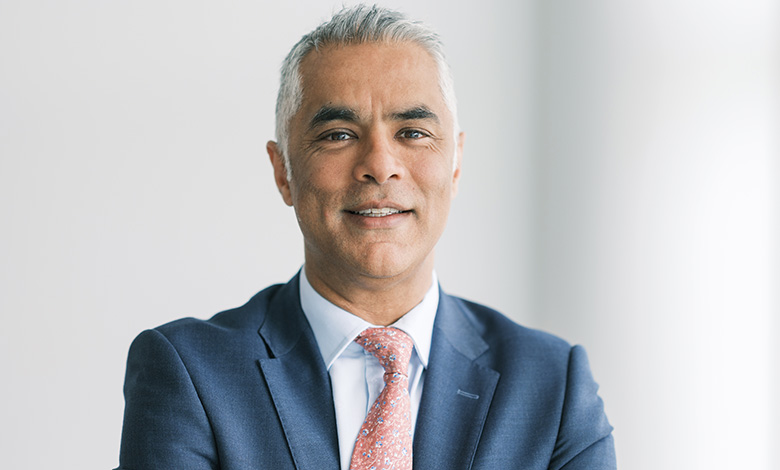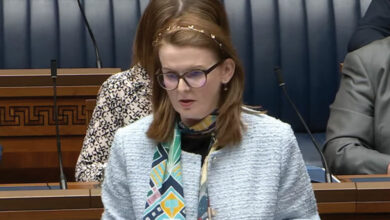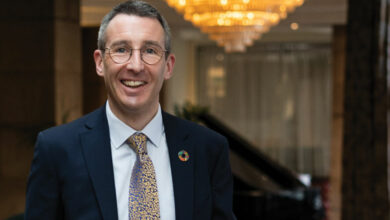A gas network for a decarbonised future

New Phoenix Natural Gas Chief Executive Officer, Kailash Chada, talks to David Whelan about his vision for the gas network as a central component of a decarbonised energy system.
Having served as Phoenix’s Chief Financial Officer for the past six years, Chada is well acquainted with the journey Phoenix is on as a key part of Northern Ireland’s energy future.
Phoenix recently connected the 250,000th property to its gas network, a sizeable feat for an organisation which began building the industry in Northern Ireland, from a standing start, just over 25 years ago.
Today, Phoenix Natural Gas is one of the largest businesses in Northern Ireland, having built around 4,000km of gas network pipelines, making gas available to around 350,000 properties in doing so, with new connections averaging around 10,000 per year across that 25-year period.
However, Chada is aware of the scale of the challenge facing the organisation over the next quarter-of-a-century, as Phoenix seeks to integrate renewable gas solutions into its expanding gas network.
Crucially, the CEO believes that the marketplace leadership role that Phoenix has established can be readily transferred to the decarbonisation challenge.
“When you look at the origins of Phoenix, the values instilled from the very beginning are the same values that will serve us and Northern Ireland well for the future. In building an industry we developed excellent relationships with key stakeholders including communities, businesses, and government. We cultivated a skills capacity and independent gas industry supply chain that now employs some 2,500 people, while attracting private finance to build our network capacity,” explains Chada.
“Most importantly, we embedded a culture across the industry that saw Phoenix push through delivery challenges with a ‘can do’ attitude. This is exactly the type of attitude that will be necessary if we are to reach our decarbonisation ambitions. Indeed, I believe Phoenix’s experience, particularly in the area of market development and service delivery can serve as an exemplar to emerging renewable industries.”
The publication of the Department for the Economy’s Path to Net Zero Energy in December 2021 served as a springboard for an organisation which had been internally strategising on its future role in Northern Ireland’s energy system for some time.
While ultimately Phoenix’s 2050 pathway sees the business move away from the distribution of fossil fuels in its network, Chada is clear that the organisation can continue to drive down carbon emissions through natural gas supply in the near term, whilst the introduction of renewable gas solutions scale up in the coming years.
“Decarbonisation is a global problem but the solutions will be shaped by local, regional energy landscapes. We are cognisant that a decarbonised energy system does not have a role for fossil fuels. However, the Phoenix network is a regional asset and will use its unique attributes to play a key role in supporting an integrated decarbonised energy system for homes and businesses across Northern Ireland,” he states.
Highlighting that the conversion of a home from an inefficient oil boiler to connection to the natural gas grid can garner a carbon emission reduction of up to 50 per cent, Chada points to the impact this has made over the past 25 years.
In 2021 alone, Northern Ireland’s natural gas users collectively prevented over a million tonnes of CO2 from entering the atmosphere; the equivalent of taking circa 500,000 cars off Northern Ireland’s roads each year.
“To date, the gas network has played a major role in reducing carbon emissions for Northern Ireland. Therefore, in the medium term, continuing to switch domestic properties from oil to natural gas offers an immediate decarbonisation impact that will reduce emissions from the residential sector over the next decade. Switching to natural gas also prepares these homes for the transition to utilising renewable gases in the future.
Emphasising that Northern Ireland’s ambition for self-sufficiency in indigenous renewable energy will require a combination of solutions, Chada says that continuing to utilise Northern Ireland’s £1 billion gas network will not only protect consumers’ investments to date, but also supports other sectors’ transition to net zero.
“I believe Phoenix’s experience, particularly in the area of market development and service delivery can serve as an exemplar to emerging renewable industries.”
“The network was installed relatively recently, placing the gas network ahead of the curve compared to older networks elsewhere, such as in Great Britain. The distribution network in Northern Ireland consists of modern plastic pipes ready to distribute biomethane, and well placed to also embrace hydrogen. By transitioning the gas network away from natural gas to indigenously produced renewable gases like biomethane and hydrogen, we are providing an opportunity for our existing network infrastructure to become a key enabler in Northern Ireland’s pathway to net zero,” he explains.
“At the heart of our pathway is a vision of an affordable, least-disruptive, transition to net zero where energy users can continue to enjoy all the convenience and benefits of a gas heating system, safe in the knowledge that the gas they use will be 100 per cent renewable by 2050.”
Biomethane
Recent research by Queen’s University Belfast estimated the potential for biomethane to account for more than 80 per cent of the region’s gas distribution network demand. Importantly, highlights Chada, biomethane is almost indistinguishable to the composition of natural gas, meaning it requires no change from the consumer.
Later in 2023, biomethane will be injected into the Northern Ireland gas grid for the first time, and the Phoenix CEO believes that is a crucial step for on-gas grid consumers, who will be able to take advantage of a decarbonised heating solution, that does not require behaviour change or expensive retrofit.
The use of biomethane in the gas grid is a proven technology, with over 20,000 anaerobic digestion plants already in existence across Europe. For instance, Denmark currently has around 30 per cent of its gas volumes coming from biomethane, with a target to move to 100 per cent by 2034.
“Biomethane is a proven alternative to natural gas which is already injected into gas networks across Europe,” Chada says, adding: “As well as reducing the carbon footprint, with no change for the consumer, the environmental benefits include re-purposing methane from waste, which would otherwise be released into the atmosphere.
“It is important to note that the vast majority of the feedstock required to produce this level of biomethane is located within 10km of the existing gas network, a feature that is supporting the high level of early adopter interest that gas networks are currently experiencing.”
Hydrogen
Although still in its early stages in Northern Ireland, Chada is in no doubt that green hydrogen will play a major role in Northern Ireland’s decarbonised energy future. However, unlike other economies, Northern Ireland does not have a large industrial sector to drive demand and production. The current gas network can safely accommodate a 20 per cent hydrogen blend without any material impact on the gas network or consumer appliances, and Chada believes the network represents an enormous potential source of ready demand for hydrogen, which could unlock early investment in Northern Ireland’s hydrogen economy.
As a result, Phoenix is working to establish relationships and partnerships across various industries in Northern Ireland to progress the development of a hydrogen industry, and importantly, launch pilot projects, to demonstrate the capabilities.
The Department for the Economy’s Energy Strategy has pledged to review the existing legislative provision for hydrogen to be injected into the gas network by 2025. Significant work is underway to prepare the gas network to accept 100 per cent hydrogen with Chada suggesting that hydrogen-only zones within the network can be developed once hydrogen production facilities become established.
Policy
Alongside its own collaboration across industries, Chada believes that Phoenix’s regulated model is an optimal vehicle to attract investment into Northern Ireland and one that has demonstrated that it is well placed to deliver on local executive energy policy objectives. However, he says that given the scale of challenges ahead government policy must now be directed at creating the necessary market frameworks and mechanisms to accelerate the transition to renewable gas solutions.
Future
Alongside the Utility Regulator, Phoenix is in the process of finalising its new price control out to 2028 (GD23). This includes a provision for proof-of-concept/innovation projects, that Chada describes as “invaluable” in helping to create the right environment for the expansion of renewable gases on to the gas network.
“The timing of this price control is favourable because we are in a defining period. The actions taken within the next six years will allow the region to meet 2030 targets whilst also creating the foundational regulatory, legislative and market platforms to support 2050 net zero ambitions. We are already very clear on what needs to be done to have a decarbonised economy on or before 2050, and what is required now is action.
“Phoenix’s extensive experience in delivering market solutions through effective partnerships and enabling change coupled with our modern gas network asset and established supply chain leave us ideally placed to play a central role in an increasingly integrated energy system that delivers economic, sustainable solutions to homes and businesses in Northern Ireland.”
|
Profile: Kailash Chada Born in Magherafelt and raised in Portrush, Kailash Chada started his career with PwC in Edinburgh before undertaking several senior roles in leading financial institutions in London, including Royal Bank of
Scotland, where he was Chief Finance Officer and interim CEO for a division of Ulster Bank. After returning to Northern Ireland with Ulster Bank, Chada took up the post as Chief Finance Officer at Phoenix in 2017, and was later appointed CEO in April 2023. A married father of three sons, Chada is a rugby, hockey, and cricket enthusiast.
|









